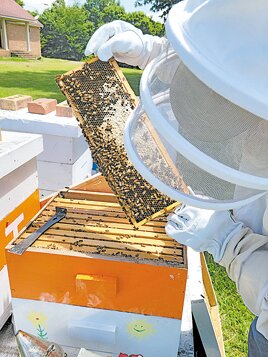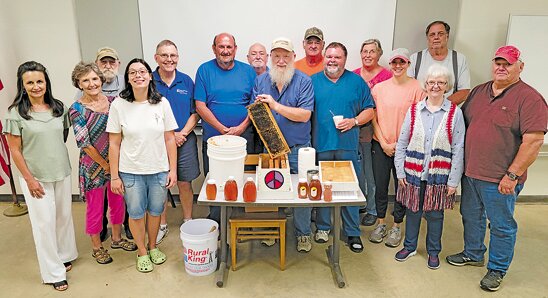From the Hive to the Home, Beekeepers Spreading Sweet Treats
 Steve Biggs presents from one of his beehives.
Steve Biggs presents from one of his beehives.BY JASMINE WILLIAMS
jasmine@dresdenenterprise.com
A group of Northwest Tennesseans are as busy as bees and their efforts are the bee’s knees.
The Northwest Tennessee Beekeepers Association is a non-profit organization that for over a decade has been working to promote the health and welfare of bees and educate new beekeepers, schools, communities and the public about bees, honey, pollination, and beekeeping.
Beginning from branching out of the Jackson club, the Northwest Tennessee branch has members from across Weakley, Henry, and Obion counties, with some even coming down from Kentucky for meetings.
The association is needed in this area to demonstrate how important bees are for this area and the globe. Honeybees are responsible for a third of the food that people consume. President of the Northwest Tennessee Beekeepers Association Steve Biggs said, “We need the honeybees in this area and we know how to take care of them and for people to know they are not a danger to them ordinarily, as long as they do not feel threatened or bothered and the public needs to know how good they are.”
But bees also help to produce a sweet treat that many know well, honey. Steve Biggs said it this way, “Honey is the perfect food as it does not go bad and does not have to be kept cold or hot.” Even going on to say that when eating honey, you consume small amounts of pollen and if you eat locally-made honey, it can help during allergy season. Many of the members of the association produce honey and sell it at the Dresden Farmers Market and through the association’s Facebook page.
Most of the honey the members sell is called, “Wildflower Honey,” meaning that it is honey made by anything that the bees pollinate and take nectar from that includes, clover, wildflowers, watermelons, pumpkins, apples, blackberries, and flowers that are grown in the area by gardeners.
Some honey, if there are enough acres of a crop, can be a specific form. Biggs noted that in California beekeepers sell Almond Honey because of the amount of almond tree farms in the area the bees feed off of. What plants the bees feed off of effects the flavor of the honey and can have a slight taste of a main crop they visited for pollination.
All of the members in the association do not add any sugar or syrup to keep the honey all-natural. It is also very different in taste than what is sold in stores, having much more flavor.
The association works with community to promote the importance of bees in the area, including outreach. It donated the first six beehives to the University of Tennessee at Martin. Some members take their hives to local farms to pollinate their crops. Biggs gives presentations to schools in the area on bees and beekeeping. Other members have visited for summer enrichment programs to talk about bees and how honey is made. There are conversations centered around putting up beehives at a local high school in the coming years.
Protection is also important for anyone who might be near a hive during any class or seminar about bees. The association makes sure that those who are around a hive sign a waiver to wear a headgear bee suit to prevent being stung on the face to protect the eyes. Those who think they might be allergic must wear the full beekeeper suit to protect their entire body.
In 2018, they had more than 80 members. After COVID, the number of those who renewed memberships and still attend meetings has dropped to about 40 members this year.
“Anybody can become a beekeeper and the good thing is that you don’t have to do anything but provide a place for them to live and they can provide for themselves. We are trying to manage the hives to increase the population and to also collect honey. I like to say I collect hidden money from the bees with the honey they make,” Biggs said.
Meetings hosted by the association are free for everyone. To become a member, you must pay dues; in doing this you get a mentor to help get started in beekeeping and they get access to the club’s honey extractor. The members try to help those who want to be involved in honeybees, gain knowledge and begin having a hive of their own.
However, do not expect to get honey from your new bees soon. Some hives need more than a year to produce honey that can be collected as bees feed off of honey during the winter.
Beekeeper Association meetings are held on the third Thursday of every month on the campus of UT Martin off of Moody Street in the lower classroom.
They have a short course about beekeeping, and they hold a drawing to give away three beehives with bees to new members. There are door prizes to those who are new to the association.
“Anyone that is interested in honey or think they are, they should come to one of our meetings and come in and listen. There will be no charge and I can guarantee they will be accepted and will take a lot of information away from this. It is something that, if you have never done it, you will want to do it.”
There are speakers who will talk about bees and offer classes to show first-time beekeepers how to draw honey out of the hives that they have. Upcoming speakers include Kent Williams, one of the top beekeepers in Kentucky. Chuck Collins of the Bee Barn in Paducah, Kentucky, and many other professors from the UT system have been guest speakers in the past.
For those who are curious about how honey is extracted, the process is very simple as seen by this writer. The beehive frame, when the bees create a honeycomb and place the honey on, is taken out of the hive and to a different location away from the bees. Then the top of the honeycombs is cut off using a knife or any long, sharp object. Then the frame is placed into a honey extractor, which spins the frame around and flings the honey out of it. The honey then is filtered so that there are no combs in the honey and it is bottled. The process took less then 15 minutes to go from comb to bottle.
The honeycombs can then be placed back into the hive or even consumed. The combs act much like gum does in that it can be chewed on until the flavor is gone. It creates more work for the bees, however.
From the field to the table, local beekeepers are ensuring community members have a tasty, local treat and that is truly, the bee’s knees.
 Northwest Tennessee Beekeepers' Association
Northwest Tennessee Beekeepers' Association




